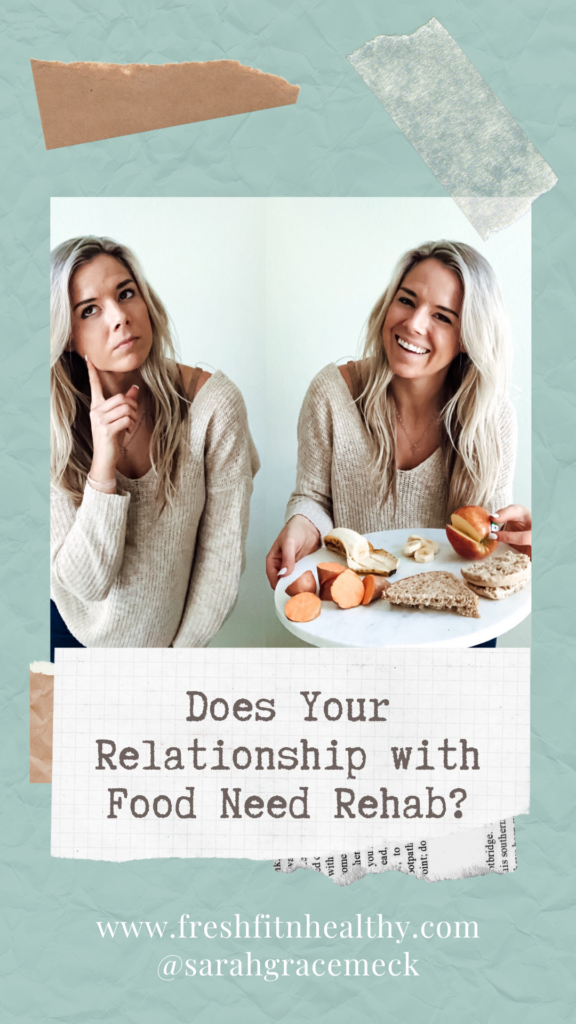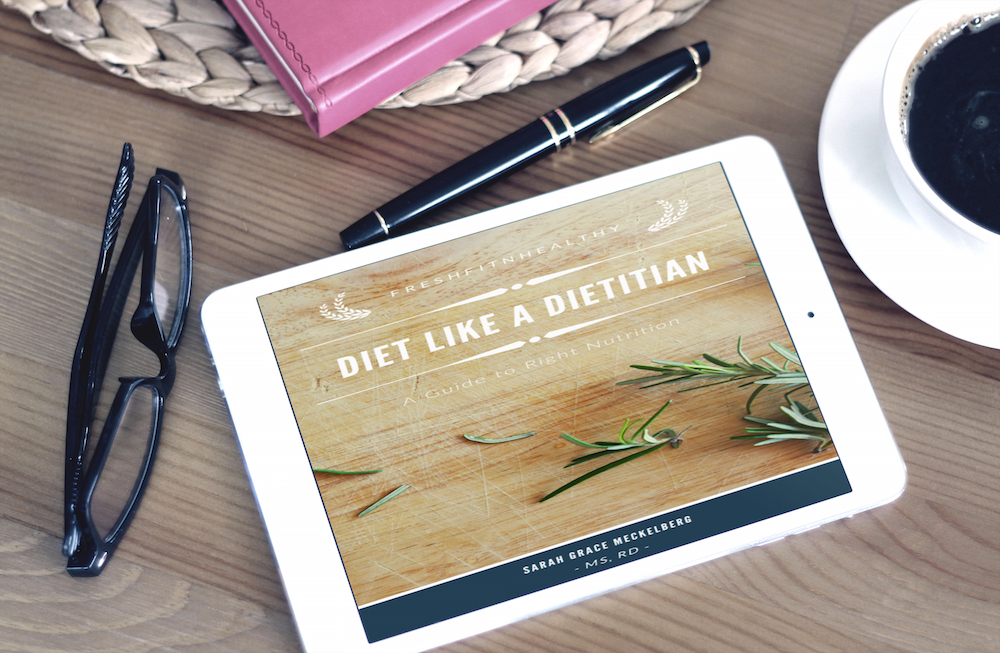Do you think your relationship with food needs help?
With the majority of the nation staying home due to the coronavirus our relationships with food is being tested. Are we overeating because it’s available? Using food to deal with boredom and stress? Or thinking of food all day long, preoccupied with what we’re going to eat next? These are all signs you may need rehab for your relationship with food. If any of these signs resonate with you then don’t worry because I’m also going to be sharing steps for how to create a life long healthy relationship with food.
Listen to the Podcast on iTunes right here
Listen to the Podcast on Spotify here
Signs That Your Relationship with Food Needs HELP
1. Can’t Keep Your Eyes On Your Own Plate
This is what I like to call plate envy. When we don’t have a good relationship we’re constantly comparing what we’re eating with others instead of listening to our true hunger and fueling our bodies accordingly. You are seeing what they’re eating for one meal; one meal isn’t a good representation of what they’ve eaten the whole day. Remember not everyone’s needs are the same! A tip to help this is to order first so your choice isn’t dictated on others desires/needs.
2. You Live For Your Cheat Day
So many people claim that you need a cheat day in order to stay sane. But when you’re living a healthy lifestyle all foods fit in moderation so you don’t need a cheat day. You shouldn’t feel like you’re restricting and deprived all week. You should feel like you’ve been able to fuel your body well and have your favorites at the same time. So if you feel like you’re living for when you splurge and let loose it’s a sign you may need to work on your relationship with food!
3. You Eat To Cope With Emotions
Eating to fill the void from any emotion whether it’s boredom, stress, sadness, or excitement. If you occasionally eat when you’re not really hungry that’s normal, it’s human nature to sometimes eat for pleasure. But if you’re constantly eating when you’re bored or stressed then it’s a sign to fix your relationship with food.
4. You Label Yourself Good Or Bad Based On Eating Habits
Example if I drink my green juice today I’m good. Or if I missed my workout today then I’m bad. No matter what society preaches or morality isn’t linked to food.
5. Punish Yourself For Less Than Healthy Eating
If you have a day where you overeat or didn’t follow according to plan and you punish yourself. This can look like feeling guilty, or reviewing it over and over in your head saying “I failed myself”. Our health journey is not a pass or fail exam. It’s about progress not perfection. Instead of punishing yourself say “Given today’s circumstances, I did do my best”. If today wasn’t the best then learn from your shortcomings and use it to make the next day better.
6. You Take Limits To The Extreme
It’s one thing to start to make changes to see physical progress or feel better overall vs take it to an extreme and eliminate all carbs. Example of extreme: I can’t ever have sugar. A healthy lifestyle is more about decreasing the amount of processed foods and sugar because it’s not making me feel my best. With extremes such as “I’m going to take sugar out for 30 days” what happens on day 31? If you say i’m never going to have sugar again we all know that’s never going to last; and it only negatively impacts your relationship with food.
7. You’re Number Obsessed
Whether it’s my fitnesspal, macros, total calories, or your weight on scale. If you feel like you are obsessing over any number it’s not a healthy sign. Tracking with numbers can be healthy such as making sure you’re consuming macro balanced meals in order to curb cravings and feel your best. But I’ve had people who won’t eat ketchup without weighing it because they’re scared of their macros being off. Remember calories goals are a general estimate of your body’s needs. And these needs change daily. Having set numbers that you won’t allow yourself to go above or below is unhealthy. Yes goal numbers can be helpful and a great guide but above all listen to your hunger.
If you’re obsessed with looking at the scale weight remember that it’s one of the worst measures of progress. You could be swapping muscle for fat, be feeling better, and have your clothes fitting looser but the scale hasn’t changed.
8. Food Is The Main Preoccupation Of Your Life // Your Relationship with Food Disrupting Your Life.
Your whole day revolves around what you’re going to eat next or what other people are eating. Food should not be the sole focus of your life. Health and fitness should help you feel your best and fuel your body well but not be the main priority in your life.
9. You’re hungry all the time
If you’re feeling hungry all the time, it’s a sign you are not eating enough. Maybe you’re following a restrictive diet or have followed one in the past. Super restrictive diets can damage your metabolism as well as your relationship with food.
Steps To Take To Heal Your Relationship With Food
- Clear your environment both online and physically with things that promote negativity around food //content that makes you feel like you need to diet. Maybe you’re following people that are promoting diet culture. Or your friends physically around you are constantly talking about their bodies or diet. This toxic talk is going to rub off on you so be careful of who and what you are surrounding yourself with.
- Get MAD at diet culture and how it’s affected you. If you’re constantly preoccupied with food, guilty, depriving yourself, feeling hungry that should make you angry. Remember what diet culture has done to you in your past and get mad so you finally ditch it once and for all. And you’re finally ready to create a #freshfitnhealthy life that doesn’t include dieting.
- Ditch the dieting rules, the good and bad, the food police in your head. These rules are made up by society such as “carbs are bad” or “I can’t eat after 7 pm”. Ditch all the myths out there and say yes I believe all foods can fit just with the right moderation and balance.
- Start with the basics, the lifestyle changes that are smaller steps but make a big difference long term. These are sleep, stress, hydration, consuming more whole foods, and less processed foods. Start to focus on the basics first before you get into the nitty gritty. Ask yourself “How can I make this one meal a little better?”
- Begin to practice mindfulness when eating. Such as sitting down to eat, asking if you’re hungry, listening to both hunger and fullness cues.
- Work with a professional to do these things if you feel you are unsure of how to do it on your own. It’s a good thing to seek help in areas you need it, not something to be embarrassed about! It’s not an expense, it is a lifelong investment. You’re worth investing in! When seeking help don’t fall for someone without credentials behind their name
PS: My new Diet Like A Dietitian guide, walks you through how to create that LASTING lifestyle that helps you discover true health physically, mentally, and emotionally — and become the expert of your own body! If you don’t want to work with a coach but you want to do something that teaches you all this and more then definitely consider looking at this guide! https://www.sarahgracemeck.com/nutritionguide
Let me know by sharing on instagram and tagging me @SarahGraceMeck what you took away from this most. What sign stood out to you most that you need help with your relationship with food?

